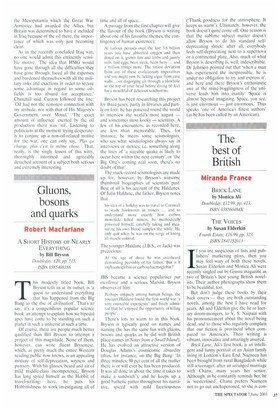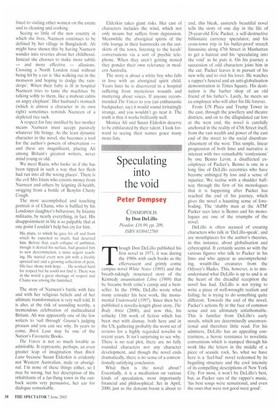The best of British
Miranda France
BRICK LANE by Monica All Doubleday, £12.99, pp. 413, ISBN 038560484X THE VOICES by Susan Elderkin Fourth Estate, £16.99, pp. 323. ISBN 1841152013 If you are suspicious of lists and publishers' marketing ploys, then you may feel wary of both these novels. Susan Elderkin and Monica Ali were recently singled out by Granta magazine as two of Britain's best young British novelists. Their author photographs show them to be beautiful, too.
But don't judge these books by their back covers — they are both outstanding novels, among the best I have read for years. Ali and Elderkin give the lie to literary doom-mongers, to V. S. Naipaul with his pronouncement about the novel being dead, and to those who regularly complain that our fiction is provincial when compared to America's. Their writing is vibrant, innovative and amazingly assured.
Brick Lane, Al's first book, is an intelligent and funny portrait of an Asian family living in London's East End. Nazneen has been brought from rural Bangladesh while still a teenager, after an arranged marriage with Chanu, many years her senior. Although, as he constantly reminds her, he is 'westernised', Chanu prefers Nazneen not to go out unchaperoned, so she is con
fined to visiting other women on the estate and to cleaning and cooking.
Seeing so little of the new country in which she lives, Nazneen continues to be defined by her village in Bangladesh. Ali might have shown this by having Nazneen wander into reveries about her childhood. Instead she chooses to make more subtle — and more effective — allusions. Crossing a North London road without being hit by a car is like walking out in the monsoon and hoping to dodge the raindrops'. When their baby is ill in hospital Nazneen tries to tame the machines by talking softly to them, like a mahout calms an angry elephant'. Her husband's stomach (which is almost a character in its own right) sometimes reminds Nazneen of a depleted rice sack.
A respect for fate instilled by her mother means Nazneen must accept passively whatever life brings. As the least dynamic character in the novel, she becomes a tool for the author's powers of observation — and these are magnificent, placing Ali among Britain's greatest writers, never mind young or old.
We meet Razia, who looks as if she has been tipped in such a way that her flesh had run into all the wrong places'. There is the evil Mrs Islam who extorts money from Nazneen and others by feigning ill-health, swigging from a bottle of Benylin Chesty Cough.
The most accomplished and touching portrait is of Chanu, who is baffled by his Londoner daughter's behaviour, by Islamic militants, by nearly everything, in fact. His disappointment in life is so palpable that at one point I couldn't help but cry for him.
His plans, to which he gave his all and from which he expected so much, had deserted him. Before that, each collapse of ambition, though it dented his surface, had goaded him to new determination, a more urgent reaching. He started every new job with a freshly spruced suit and a growing collection of pens. His face shone with hope. . He worked hard for respect hut he could not find it. There was in the world a great shortage of respect and Chanu was among the famished.
The story of Nazneen's battle with fate and with her religious beliefs and of her ultimate transformation is very well told. It is also, at the risk of sounding worthy, a tremendous celebration of multicultural Britain. Ali was apparently one of the few writers to 'sail through' Granta's judging process and you can see why. In years to come, Brick Lane may be one of the Nation's Favourite Books.
The Voices is not so much lovable as admirable. It represents, perhaps, an even greater leap of imagination than Brick Lane because Susan Elderkin is evidently not Western Australian, male or aboriginal. I'm none of these things either, so I may be wrong, but her description of the inhabitants of a far-flung town in the outback seems very persuasive, her ear for dialogue remarkable. Elderkin takes giant risks. Her cast of characters includes the wind, which not only moans but suffers from depression. Meanwhile the aboriginal spirits of the title lounge in their hammocks on the outskirts of the town, listening to the locals' conversations via a sort of psychic telephone. When they aren't getting stoned they ponder their own relevance in modern Australia.
The story is about a white boy who falls in love with an aboriginal spirit child. Years later he is discovered in a hospital suffering from mysterious wounds and muttering about voices. If anyone recommended The Voices to you (an enthusiastic backpacker, say) it would sound irritatingly strange, and you wouldn't go near it. The truth is that it works brilliantly well.
Monica Ali and Susan Elderkin deserve to be exhilarated by their talent. I look forward to seeing their names grace many more lists.











































































 Previous page
Previous page